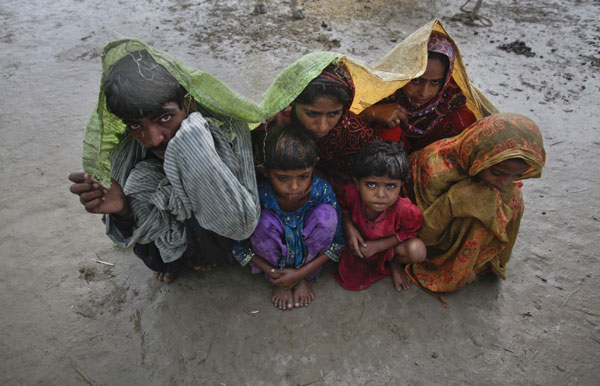Death toll from Pakistan rains mounts to 230
 0 Comment(s)
0 Comment(s) Print
Print E-mail
China.org.cn, September 15, 2011
E-mail
China.org.cn, September 15, 2011
The toll from torrential rains in Pakistan is mounting, with 230 people killed, more than 300,000 others displaced and 1.1 million homes destroyed or damaged as flooding has inundated 4.5 million acres, cutting major roads and polluting water, the United Nations reported Wednesday.
At least 5.5 million people have so far been affected, the UN Office for the Coordination of Humanitarian Affairs (OCHA) reported in its latest update, which showed in an increase in all indicators as the monsoon rains spread their damage outside Sindh province to Balochistan, threatening flash flooding in a country still reeling from last year's disastrous floods, the worst in living memory.
Two days ago the toll was put at 199 dead and 220,000 displaced, with nearly 1 million homes destroyed or damaged and 4.2 million acres flooded.
UN agencies have already ramped up their support, with the World Food Programme (WFP) set to feed 500,000 people and the World Health Organization (WHO) distributing 18 emergency health kits, each covering 6,000 people with complete essential medical care drugs for a month, and 40 diarrhoea kits, each for 1,000 people a month.
WHO also has a pre-positioned stock of medications to cover the needs of 1.2 million people.
"Water sources are no longer considered safe, leaving the affected populations to rely on open pond waters, risking the threat of communicable diseases," OCHA reported.
"Accessibility has been greatly hampered by the damage to roads. Many heath facilities are surrounded by water, making it difficult to provide health services."
Severe accessibility problems on major link roads are hindering not only aid delivery but ongoing assessments of damage and needs, it added.
OCHA noted that the Government has prioritized shelter, with most of those displaced currently living along roadsides, embankments and other areas of higher ground, as well as in public buildings including schools.
Resource mobilization is a major constraint, with aid organizations using contingency stocks and diverting resources from recovery programmes to meet life-saving needs. Last year's floods killed some 2,000 people and submerged about a fifth of the land, affecting 20 million people, as torrential rains sent swollen rivers cascading across the country from the mountainous north, inundating successive regions until they reached the sea.






